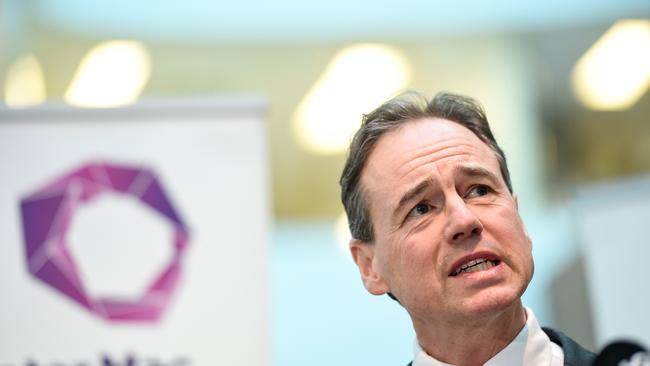Cancer patients to save more than$100,000 after Greg Hunt lists new drugs on PBS
Some cancer patients are set to have their treatment costs cut by more than $100,000 after Greg Hunt lists new drugs on PBS.

Australians with advanced melanoma will now have access to a government subsidised combination immuno-oncology treatment, saving patients more than $100,000.
Health Minister Greg Hunt today announced today that the treatment, Opdivo in combination with Yervoy, would be available on the Pharmaceutical Benefits Scheme from tomorrow.
It is the first time a combination immuno-oncology treatment, which use the body’s immune system to fight cancers, has been reimbursed by the Federal Government.
The combination therapy was one of a list of five new cancer medicines added to the PBS, which Mr Hunt said represented a $100 million investment by the Morrison Government. Thousands of patients with certain forms of leukaemia, advanced tumours of the intestine and pancreas, melanoma, bowel cancer and ovarian cancer will save up to $100,000 a year.
The PBS listings mean patients would now pay $39.50 per script or just $6.40 a script for concessional patients for the treatments.
The Opdivo and Yervoy combination treatment is for patients with unresectable malignant melanoma, which are skin cancers that have spread locally and cannot be removed by surgery.
Australia has one of the highest incidence rates of melanoma in the world with around 14,000 patients diagnosed each year. While the majority of melanomas can be treated successfully with surgery if diagnosed early, the cancer is associated with 1,900 deaths every year in Australia.
Both Opdivo and Yervoy are developed by pharmaceutical giant Bristol-Myers Squibb and without the Australian government subsidising the treatment, it would cost more than $100,000 per course of treatment.
Jonathan Anderson, medical director at Bristol-Myers Squibb Australia and New Zealand, said the Australian-first PBS listing of the combination drugs was an important milestone in patient access to immune-based therapies for cancer.
“Immuno-oncology and the use of these treatments in combination is a rapidly evolving field,” Dr Anderson said.
“Our global clinical development program is exploring the potential role of Opdivo combined with other immuno-oncology treatments in a wide range of cancers.”
Associate Professor Matteo Carlino, medical oncologist and lead investigator at Westmead Hospital and the Melanoma Institute Australia, said the combination treatment allowed doctors to tackle two distinct cancer pathways at the same time.
“The use of two complementary pathways generates more activity than either drug alone and is a new approach to treat melanoma and other cancers,” he said.
The other treatments listed on the PBS include affordable access to the $30,000 per year medication Rydapt, which is for patients living with acute myeloid leukaemia (AML) — a rare but aggressive cancer of the blood and bone marrow.
The current listing of Somatuline Autogel is being extended to include patients with non-functional gastroentero-pancreatic neuroendocrine tumours, which are advanced tumours of the intestine and pancreas. Without the government subsidy, the treatment would cost $23,000 a year.
Lonsurf, a new treatment option for patients with bowel cancer that has spread to other parts of the body, was also listed. That treatment normally costs $6,000 a year for some patients.
Lynparza for high grade serous ovarian, fallopian tube and primary peritoneal cancer — a cancer that has very low survival rates — is being amended to also allow for subsidy of a new tablet that significantly reduces the pill burden compared to the current capsule listing. Patients will now be able to take four tablets per day instead of 16 capsules per day. Without PBS subsidy this medicine would cost around $90,000 per year.




To join the conversation, please log in. Don't have an account? Register
Join the conversation, you are commenting as Logout